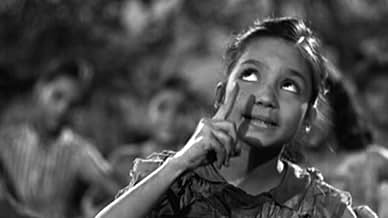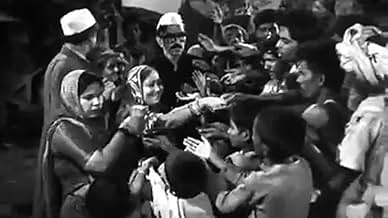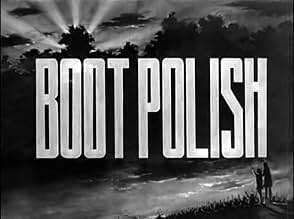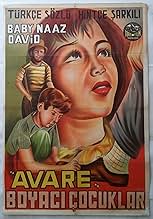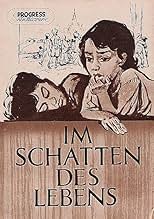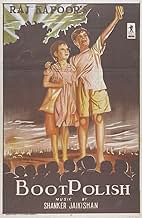Pre-teen brother and sister, abandoned by their father to be taken care of by an abusive prostitute aunt, survive life in an Indian squatters' camp, aided by a friendly cripple, by learning ... Read allPre-teen brother and sister, abandoned by their father to be taken care of by an abusive prostitute aunt, survive life in an Indian squatters' camp, aided by a friendly cripple, by learning to shine shoes instead of begging.Pre-teen brother and sister, abandoned by their father to be taken care of by an abusive prostitute aunt, survive life in an Indian squatters' camp, aided by a friendly cripple, by learning to shine shoes instead of begging.
- Awards
- 4 wins & 1 nomination total
Kumari Naaz
- Belu
- (as Baby Naaz)
Ratan Kumar
- Bhola
- (as Rattan Kumar)
David Abraham
- John
- (as David)
Chand Burke
- Kamla Devi
- (as Chand Burque)
Bhudo Advani
- Pedro
- (as Budho Advani)
Raj Kapoor
- Man asleep on train
- (uncredited)
Featured reviews
I must admit I've always enjoyed the films of Raj Kapoor especially from his early golden period, but can find his moralising laid on a little heavy at times. He took the best pathos and melodrama from Chaplin and spun it out relentlessly. As in Boot Polish. It's not that I can argue with any of his philosophising and moral instruction, just that history has proved Film itself will never change the social system; it never brings shame to the faces of our Betters, but it probably would just make them wonder how much more they can turn the screws on us. After all, Film represents an entertainment they have paid their paisa or pennies for us to waste production time watching.
Two young children are orphaned and thrown onto the not so tender mercies of their scolding prostitute aunt and nice but drunken uncle in a Mumbai slum. She teaches them to beg for a living, he tries to teach them of the better, honest and more painful way, in their case the complicated profession of polishing other people's boots. It's done very well, and if it wasn't for the comedy and the songs almost neo-realist - RK even makes a fag-in-cheek cameo at the beginning. To beg or not to beg, that is the question - but the pain of surviving the slings and arrows of capitalism goes on and on for the children, although their destitute situation does eventually improve. Baby Naaz must have been very young but she provided a marvellously believable performance. My favourite bit though amidst all the grinding poverty is the energetic comic raag Lapak Jhapak To Aare Badarwa sung by Manna Dey for the uncle and his fellow bald headed companions in jail – delicious stuff! I always wondered whether bits like these were particularly edited out in the Russian versions?
Needless to say self-sacrifice and self-effacement bring their reward - so basically it's another rewarding film from RK, an expertly produced moral melodrama.
Two young children are orphaned and thrown onto the not so tender mercies of their scolding prostitute aunt and nice but drunken uncle in a Mumbai slum. She teaches them to beg for a living, he tries to teach them of the better, honest and more painful way, in their case the complicated profession of polishing other people's boots. It's done very well, and if it wasn't for the comedy and the songs almost neo-realist - RK even makes a fag-in-cheek cameo at the beginning. To beg or not to beg, that is the question - but the pain of surviving the slings and arrows of capitalism goes on and on for the children, although their destitute situation does eventually improve. Baby Naaz must have been very young but she provided a marvellously believable performance. My favourite bit though amidst all the grinding poverty is the energetic comic raag Lapak Jhapak To Aare Badarwa sung by Manna Dey for the uncle and his fellow bald headed companions in jail – delicious stuff! I always wondered whether bits like these were particularly edited out in the Russian versions?
Needless to say self-sacrifice and self-effacement bring their reward - so basically it's another rewarding film from RK, an expertly produced moral melodrama.
This is a Hindi language film starring Rattan Kumar and Kumari Naaz.
The film is about the struggle to survive of two children, a brother and sister.
The premise is how after being orphaned, they have to beg to earn money for their guardian, a cruel aunt. And how they rise from that stage to trying to learn a skill and earn money for themselves.
And in my eyes, the film would have been a masterpiece if it had progressed from there to showing how they also get independent and help similar others struggling also to rise. It would have been an inspiring film for the newly independent country.
Instead the film refuses to leave its melancholic and cynical tone and shows that it's difficult for the poor to rise by themselves. A tone that it had set upfront by showing characters in black and white shades than the truly gray shades we all are, especially the aunt.
The message at the end is also very cynical. Where the spirit of the boy is shown as finally broken, and he is then humiliated in front of his own sister.
And the final message that the poor can only be redeemed by the rich!!
The purpose and the point of the film was missed in the melodrama and the film was awarded Best picture in 1954..
I rated it 6/10 in IMDB.
The film is about the struggle to survive of two children, a brother and sister.
The premise is how after being orphaned, they have to beg to earn money for their guardian, a cruel aunt. And how they rise from that stage to trying to learn a skill and earn money for themselves.
And in my eyes, the film would have been a masterpiece if it had progressed from there to showing how they also get independent and help similar others struggling also to rise. It would have been an inspiring film for the newly independent country.
Instead the film refuses to leave its melancholic and cynical tone and shows that it's difficult for the poor to rise by themselves. A tone that it had set upfront by showing characters in black and white shades than the truly gray shades we all are, especially the aunt.
The message at the end is also very cynical. Where the spirit of the boy is shown as finally broken, and he is then humiliated in front of his own sister.
And the final message that the poor can only be redeemed by the rich!!
The purpose and the point of the film was missed in the melodrama and the film was awarded Best picture in 1954..
I rated it 6/10 in IMDB.
This film ranks as one of the finest thought provoking social dramas asking how we look at ourselves given the limited resources and choices and faced with overwhelming odds. Raj Kapoor's presentation of the humble lifestyle of two children who wish to overcome the obstacles of abject poverty shows the importance of the spirit of endurance and dedication in the face of adversity. We can learn from children when they try to face challenges in the world created by greedy souls.
I would recommend this film as a lesson in the triumph of the human spirit when facing the evils of man made adversity. We probably can relate to the two youn protaganists of the film in our everyday lives. Life can be a bitch, and films such as BOOT POLISH show the more dramatic encounters of what we call the human struggle.
I would recommend this film as a lesson in the triumph of the human spirit when facing the evils of man made adversity. We probably can relate to the two youn protaganists of the film in our everyday lives. Life can be a bitch, and films such as BOOT POLISH show the more dramatic encounters of what we call the human struggle.
All I want to say that every person living in this world should watch this Indian movie.Especially Who are Afraid ,Coward and thinking about themselves that they are of no use in this world, in their life.Whoever is Hating Himself must watch it. As I watched this movie for first time I broke into tears .I am a teenager Guy Though.I can't explain how beautifully every thing is Explained In this movie that gives you a Strong Determination & Inspiration to not lose hope and have self respect. Finally i wanna request you that for god's sake go for this movie at least once if you have true compassion within you.Hat.s off for the respective director including his cast and crew.
This is the sort of film which shows both the strengths - and the weaknesses - of classic Bollywood cinema. Conceived and executed more often than not with the mass audience in mind, but hoping to make some serious statements behind all the light entertainment, 'Boot Polish' suffers from being a little too long, as well as possessing an over- simplistic ending. On the plus side there is some great acting by the two young leads and some excellent social comment to be gleaned, conveyed through the fine black and white cinematography. Raj Kapoor, who makes a cameo appearance in the film, apparently saw the first cut of the project, then promptly scrapped a lot of what had been produced to start over again. His presence is perhaps most felt in some the Chaplinesque scenes and reforming sentiments which which surround Belu and John's kindly uncle (Prabhu Arora). The inherent decency of people, and the cinematic pathos of children torn from their guardians are all familiar from some of Chaplin's films.
As some critics have noted the two children, with Uncle's then John's particular insistence on the dignity of labour and disavowal of begging as a way of life, can be seen as symbolising the ambitions and hopes of Young India - which interpretation explains the somewhat naive ending of the film. Despite the distress which overtakes some of the young participants, Boot Polish ends on a note of optimism for the future, presumably echoing the Congress Party's offical line at the time. Before the two reach their just deserts however, and during their struggles to make ends meet and make their boot cleaning business work, there is a more obvious cinematic influence: that of the Italian Neo-Realists, especially Vittorio De Sica, whose own 'Shoe Shine'/'Sciuscià' had appeared in 1946.
While one or two of the songs interspersed through the film might be willingly dispensed with by modern Western audiences, there's one comic number (sung by Uncle in prison with a cell full of bald men) which is priceless and shouldn't be missed. Uncle is a convincing proseyltizer for the national Way Ahead, while a minor disreputable scoundrel in his own right. Less convincingly drawn are the parents who adopt Belu. Their all-round charitable concern reminds one of the childless couple who take Oliver Twist in off the streets, which is a form of symbolic caring rather than one dramatically fulfilling for the reader/viewer.
A word should be said about the excellent performance by Baby Naaz as the young sister Belu, in this her first appearance on screen. Although she only made a handful of films, her talent is amazing (as self aware and as talented as the young Jodie Foster IMHO) and is one of the biggest reasons to see the film.
Taken as a whole, 'Boot Polish' is very entertaining as well as being typical of the time at which it was made. If you enjoy classic Bollywood at close to its best, then this will worth looking out for. Admirers of the great Raj Kapoor will need little persuasion, but those who wish to see a great comic turn by Arora (is this really his only film?) will be advised too.
As some critics have noted the two children, with Uncle's then John's particular insistence on the dignity of labour and disavowal of begging as a way of life, can be seen as symbolising the ambitions and hopes of Young India - which interpretation explains the somewhat naive ending of the film. Despite the distress which overtakes some of the young participants, Boot Polish ends on a note of optimism for the future, presumably echoing the Congress Party's offical line at the time. Before the two reach their just deserts however, and during their struggles to make ends meet and make their boot cleaning business work, there is a more obvious cinematic influence: that of the Italian Neo-Realists, especially Vittorio De Sica, whose own 'Shoe Shine'/'Sciuscià' had appeared in 1946.
While one or two of the songs interspersed through the film might be willingly dispensed with by modern Western audiences, there's one comic number (sung by Uncle in prison with a cell full of bald men) which is priceless and shouldn't be missed. Uncle is a convincing proseyltizer for the national Way Ahead, while a minor disreputable scoundrel in his own right. Less convincingly drawn are the parents who adopt Belu. Their all-round charitable concern reminds one of the childless couple who take Oliver Twist in off the streets, which is a form of symbolic caring rather than one dramatically fulfilling for the reader/viewer.
A word should be said about the excellent performance by Baby Naaz as the young sister Belu, in this her first appearance on screen. Although she only made a handful of films, her talent is amazing (as self aware and as talented as the young Jodie Foster IMHO) and is one of the biggest reasons to see the film.
Taken as a whole, 'Boot Polish' is very entertaining as well as being typical of the time at which it was made. If you enjoy classic Bollywood at close to its best, then this will worth looking out for. Admirers of the great Raj Kapoor will need little persuasion, but those who wish to see a great comic turn by Arora (is this really his only film?) will be advised too.
Did you know
- TriviaThis movie is a remake of Italian movie "Shoeshine". But Raj Kapoor shaab made it in Indian style.
- ConnectionsRemade as Morad o Laleh (1966)
- SoundtracksRaat Gayi
Music by Shankarsingh Raghuwanshi & Jaikishan Dayabhai Panchal
- How long is Boot Polish?Powered by Alexa
Details
- Release date
- Country of origin
- Language
- Also known as
- Avare Boyacı Çocuklar
- Filming locations
- Production company
- See more company credits at IMDbPro
- Runtime
- 1h 30m(90 min)
- Color
- Aspect ratio
- 1.37 : 1
Contribute to this page
Suggest an edit or add missing content

